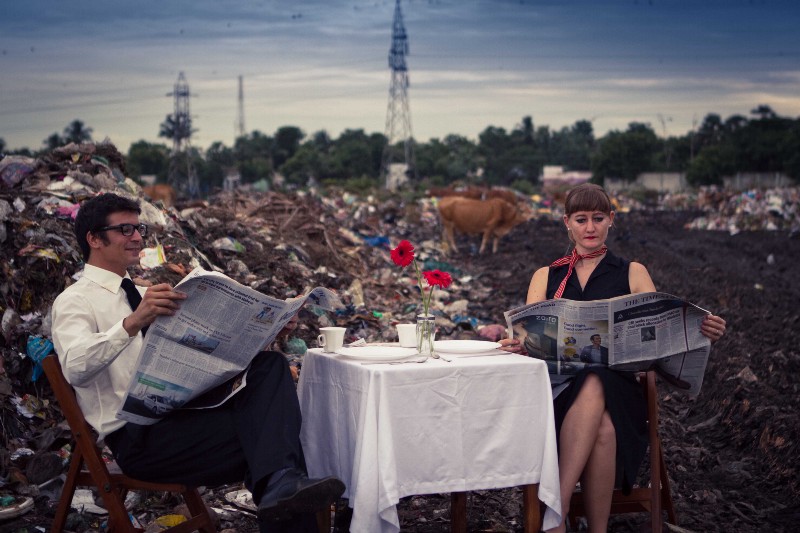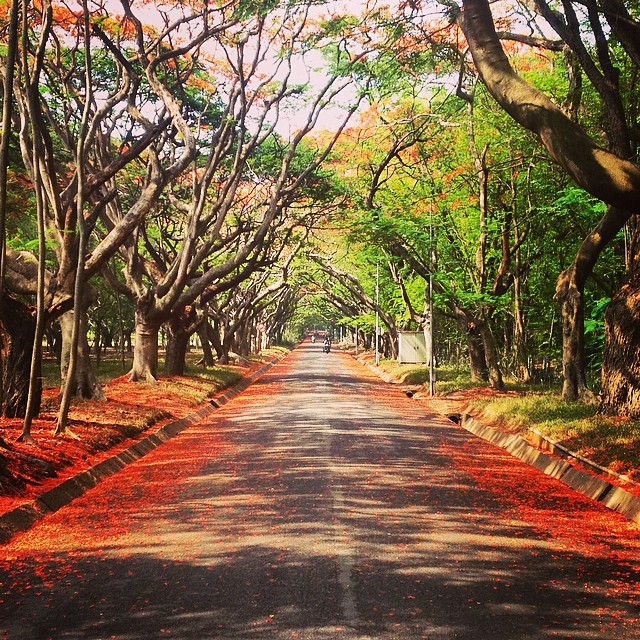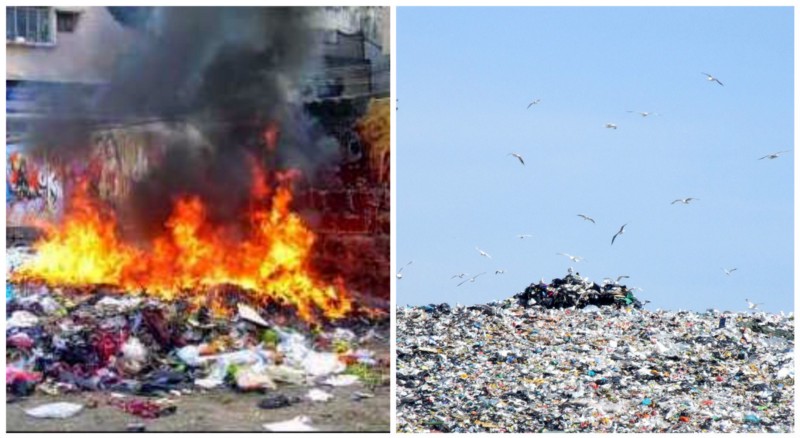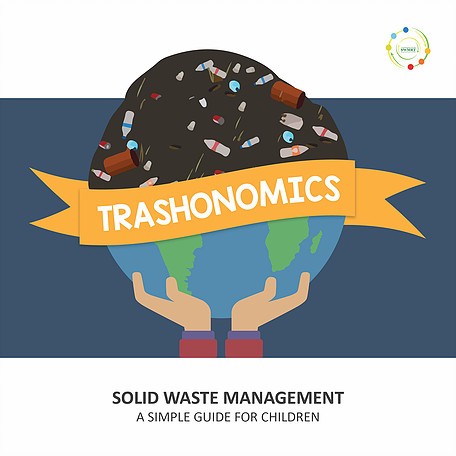How An Innovative Campaign Is Addressing The Burning Question Of Bangalore’s Waste
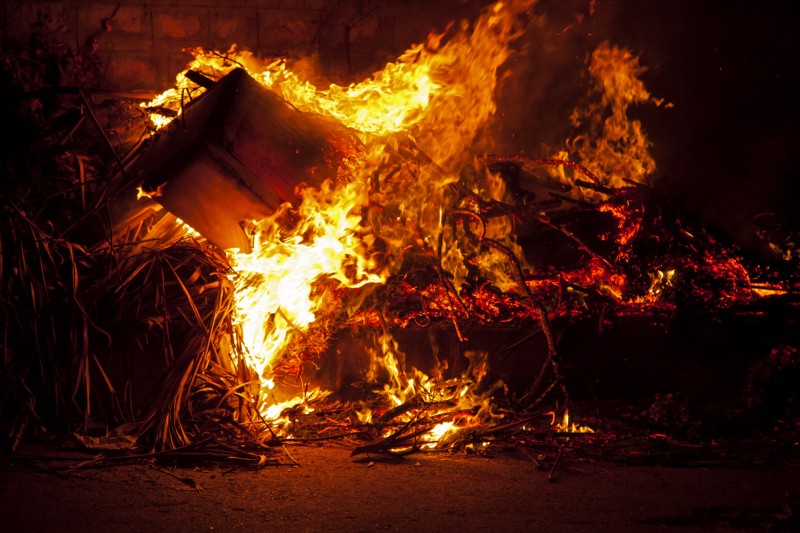
If you live in Bangalore and have been concerned about the growing piles of burning waste dotting the cityscape, then you finally have something to smile about. Over the last 4 weeks, Jhatkaa, a campaigning organisation that harnesses citizen power to bring about change, has been actively promoting#BangaloreIsBurning — a campaign to end the burning of garbage around the city.
The campaign has come at a time when the problem of garbage-burning has come to a head as smouldering piles of trash belching thick, acrid smoke into the air dot street sides and litter empty plots across the city.
Divya Narayanan, who led the campaign, explains, “Most people are unaware that a lot of garbage is being burnt inside the city. They think it happens mostly on the outskirts of Bangalore.”
So the campaign captured evidence of the instances of garbage-burning in Bangalore visually. Photojournalist Hari Adivarekar visited landfills and dumpsites where garbage was being burnt, talked to people and documented its impacts on them. “There are many visuals that I can’t get out of my head, but it’s the smells I can’t forget”, he told Livemint.
Sanitation workers are ill-protected against the hazardous waste in roadside dumps
The campaign also received over 200 photographs of garbage-burning from citizens in 43 wards across the city over WhatsApp. To understand the scale of the problem, the pictures were embedded on a map and the sites plotted using tiny icons of fire. They reveal a disturbing image of a conflagrant Bangalore. The campaign blew many myths out of the water — Indiranagar, for instance, one of Bangalore’s premier neighbourhoods, registered 40 cases of garbage-burning.
The images shot by Adivarekar were displayed as a photo exhibition in Bangalore in early July and saw a good turnout, allowing Jhatkaa campaigners to engage Bangaloreans further on the topic of waste management.
The burning issue of garbage incineration
Did you know that Bangalore burns 50,000 tons of leaf litter in the winter months?
Leaves: 50,000 tons of leaf litter burn in the winter months. Due to the large amounts of air pollution caused by leaf smoke (from airborne particulates such as dust, soot etc.) and dangerous chemicals (such as CO and benzo(a) pyrene) it releases, burning of fallen leaves has been banned in many states of the US. Imagine how much carbon-rich compost you could turn all those leaves into!
Plastic: When plastic waste is burnt, it emits noxious fumes that contain carbon monoxide, furans and dioxins — harmful chemicals that disrupt hormonal function and increase the risk of cancer and lung disease.
Mixed waste: Incineration of mixed waste (plastics, organic waste, e-waste and sanitary waste) only increases the toxicity of the fumes. The particles travel long distances, aided by wind, and settle on soil, water, food and on our bodies, covering the city in a poisonous blanket.
Image source: Jhatkaa.org
Mixed waste has no destination
“Open burning of garbage is illegal according to the city’s Municipal Solid Waste Management rules”, informs Narayanan.
Yet, weak enforcement allows violators to skirt the law and since nobody knows what the penalties for violation are, cases of burning go unchecked.
With the closure of the last of Bangalore’s 3 landfills in 2013, the city had to put alternate waste management solutions in place to deal with the 4000 tonnes of garbage it produces daily. The BBMP has since implemented the 2 Bin-1 Bag method of garbage segregation at source and has installed processing units to handle wet waste, hazardous waste and Dry Waste Collection Centres (DWCCs) for dry, recyclable waste. Private contractors collect garbage from across the city and take them to these units. But, since the processing units only handle segregated waste, if you give your collector mixed waste, he is forced to dump it somewhere and set it on fire because it will not be accepted into any of these processing centres.
The problem of waste management, therefore, requires committed action from the the government — in the form of stricter laws, tougher action against violators, more efficient waste collection and more processing units.
But, since much of the problem of effective waste management depends on waste segregation at source, it is impossible without citizens taking responsibility for the garbage they generate.
Mixed waste on fire
A little less conversation
Buttressed by growing public participation in its campaign, Jhatkaa also launched a digital signature campaign, petitioning the Joint Commissioner of the Bruhat Bangalore Mahanagara Palike (BBMP), Sarfaraz Khan to intensify municipal action against violators of the solid waste management rules. The team asked the BBMP for:-
- Strict enforcement of the ban on garbage-burning
- Announcement of penalties for violators
- A helpline for witnesses to report cases of garbage-burning
Says Narayanan, a day after after delivering the petition, with close to 3000 signatories, to Mr. Khan, “With all the photo evidence we’ve gathered, the BBMP was very supportive of our campaign and has pledged its commitment to stopping this practice. But, the Joint Commissioner also admitted that the BBMP is unable to monitor every instance of garbage-burning and has asked citizens to be his eyes and ears on the ground.”
To keep the momentum going, the Jhatkaa team, besides following up with the BBMP, is stepping up its message to citizens to report cases of garbage-burning. They are also partnering with RWAs across the city to ensure efficient garbage collection and seeking the support of citizen groups across the city to help root out the menace.
BBMP staff and volunteers clean up a site of unsegregated waste
To report cases of garbage-burning around you, WhatsApp your photos to7676–022–555.
For more information on how to segregate and manage your waste at home, visit 2 Bin 1 Bag and Swacha Griha.
All images ©Jhatkaa.
Maya is a social researcher by training. Her writing has appeared in Scroll, YourStory and The Alternative. She is the Founder of Eartha and tweets @Maya_Kilpadi.





